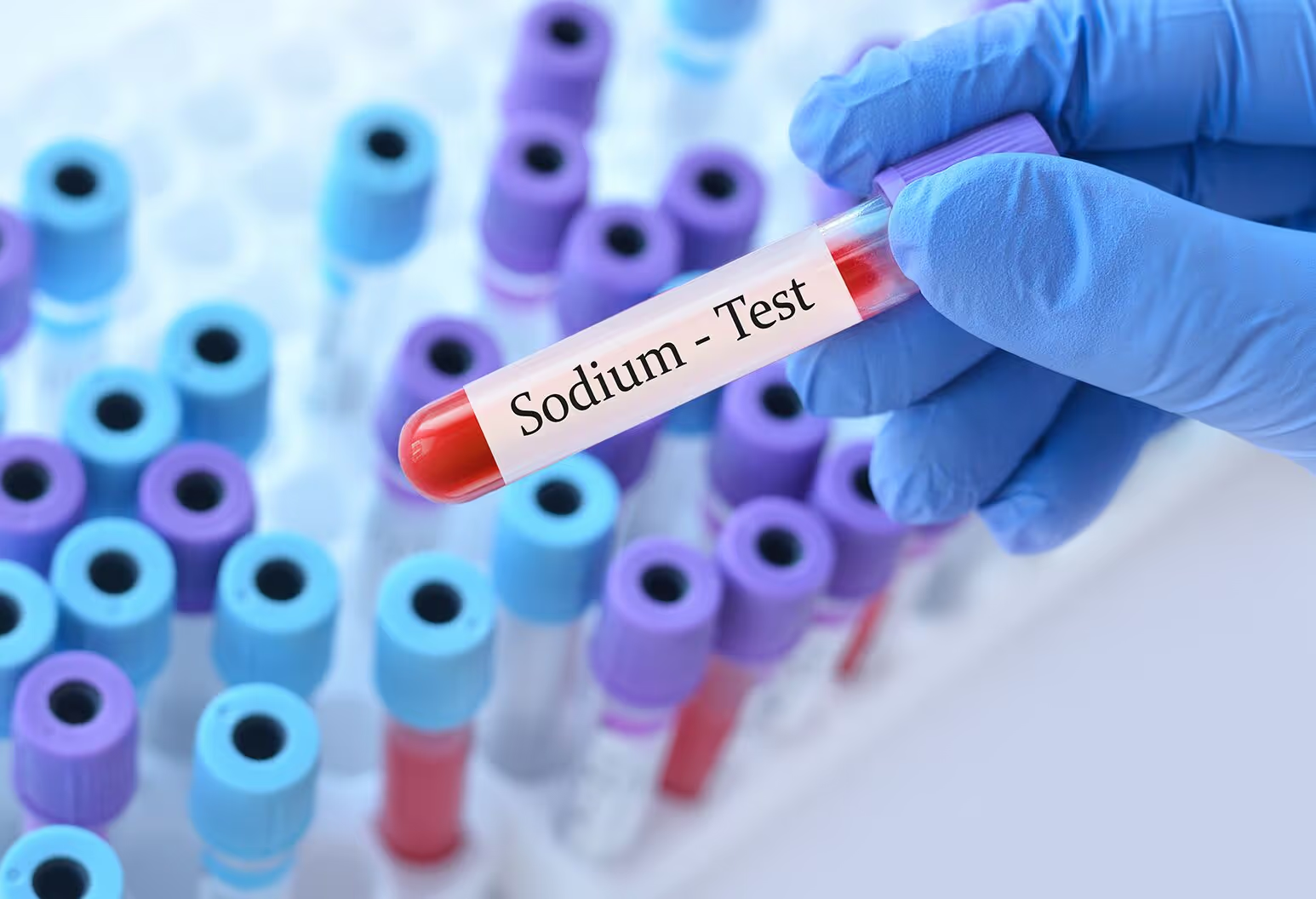Sodium Blood Test
Sodium is one of the most tightly regulated minerals in the human body. It plays a critical role in fluid balance, nerve signalling, and muscle contraction. Yet, even slight imbalances in your blood sodium levels can lead to symptoms like fatigue, confusion, seizures, or high blood pressure. In this guide, we’ll break down everything you need to know about sodium: what it does, how testing works, what your results mean, and how Everlab helps you take control of your health with proactive diagnostics.

Sodium Blood Test In Australia, Book Sodium Level Test Today
What:
Blood biomarker
Tests for:
Fluid balance and nerve function
Referral:
Required
Member cost:
$30-$60
What Is Sodium and Why Is It Important?
Sodium’s Role in the Body

Sodium (Na+) is an electrolyte—a type of mineral that carries an electrical charge. It works with other electrolytes like potassium, calcium, and chloride to:
- Regulate fluid balance between cells and tissues by maintaining proper water and sodium levels, which is essential for overall health and helps prevent imbalances such as hyponatremia
- Maintain blood pressure
- Support nerve impulse transmission
- Facilitate muscle contraction, including the heart
- Assist in nutrient absorption in the gut
Over 90% of the body’s sodium is found in extracellular fluid (outside cells), making it a key player in maintaining plasma volume and proper hydration.
The Sodium-Potassium Pump
Sodium’s function is tied to the sodium-potassium pump, a cellular mechanism that maintains the proper concentration of sodium outside cells and potassium inside cells. This balance is essential for energy production, nerve firing, and muscle performance. Sodium also helps regulate blood pH levels and supports the function of other electrolytes by influencing their movement across cell membranes.
What Is a Sodium Blood Test?
A sodium level test (also called a blood sodium test or Na test) is a blood test that measures the concentration of sodium in your bloodstream. It is usually part of a basic metabolic panel (BMP) or electrolyte panel.
Sodium blood tests are often performed with other tests, such as potassium, chloride, and kidney function tests, to provide a comprehensive assessment of your health.
How It Works
- A small blood sample is taken from a vein in your arm.
- It measures sodium concentration in millimoles per litre (mmol/L).
- May be ordered on its own or with tests for potassium, chloride, and bicarbonate.
When It's Recommended
- Unexplained fatigue or weakness
- Confusion, headaches, or seizures
- Swelling or dehydration
- Heart failure, kidney disease, or adrenal issues
- As part of routine health screening
- If your medical history suggests conditions that may affect sodium or water balance
What Can a Sodium Test Reveal?
A Na sodium blood test can uncover critical information about your health, including whether abnormal sodium levels may signal an underlying medical condition:
1. Dehydration or Overhydration
- High sodium may signal fluid loss through vomiting, diarrhoea, or excessive sweating. When the body loses water and sodium in these ways, it can disrupt the balance of sodium and water, leading to abnormal sodium levels.
- Low sodium can result from overhydration or conditions that affect fluid retention.
2. Kidney Function
The kidneys filter excess sodium. Impaired function can disrupt sodium levels. Kidney diseases, especially chronic kidney disease, can interfere with the kidneys' ability to regulate sodium and water balance, leading to imbalances such as hyponatremia.
3. Hormonal Disorders
Conditions like Addison’s disease or SIADH (syndrome of inappropriate antidiuretic hormone) can cause sodium imbalances.
4. Medication Effects
Certain medications—diuretics, SSRIs, NSAIDs, or chemotherapy agents—can affect sodium regulation.
5. Heart and Liver Health
Congestive heart failure and liver disease, including liver cirrhosis, can cause water retention and sodium dilution, contributing to low sodium levels in the blood.
6. Brain Function
Both hyponatremia and hypernatremia can affect cognition, mood, and alertness, especially in older adults. Severe or rapid drops in sodium can cause brain swelling, which may present as severe signs such as seizures, confusion, coma, or loss of consciousness.
7. Thyroid and Adrenal Glands
Endocrine disorders that affect these glands can also lead to sodium retention or excessive loss.
8. Hospitalisation Risk
Sodium abnormalities are a leading cause of preventable hospital admissions in the elderly, as both low and high sodium levels are associated with an increased risk of serious complications.
Causes of Low Sodium Count (Hyponatremia)
Common Triggers
- Diuretics or certain antidepressants
- Excess water intake (e.g., during endurance sports)
- Chronic kidney disease
- Congestive heart failure
- Liver cirrhosis
- Addison’s disease
- SIADH
Symptoms
- Headache
- Nausea
- Muscle cramps
- Irritability
- Confusion or disorientation
- Seizures or coma (in severe cases)
Causes of Elevated Blood Sodium Levels (Hypernatremia)
Common Triggers
- Dehydration
- High-sodium diets
- Diabetes insipidus
- Diuretic overuse
- Excessive sweating without rehydration
- Kidney dysfunction
Symptoms
- Thirst
- Restlessness
- Weakness
- Irritability
- Dry mucous membranes
- Confusion or lethargy
How to Prepare for a Sodium Level Test
- No fasting required (unless part of broader panel)
- Inform your provider about supplements or medications
- Stay hydrated, but avoid overdrinking water before the test
- Avoid strenuous activity just before the test
Interpreting Your Sodium Blood Test Results

Sodium Levels Normal
If your sodium levels fall between 136–145 mmol/L, you're within the normal Na level in blood range.
Low Sodium (Hyponatremia)
Low sodium levels in the blood, also known as hyponatremia, can cause a range of symptoms and may require medical intervention. May require:
- Limiting water intake
- Adjusting medications
- Hormone testing
- IV sodium replacement (in severe cases)
High Sodium (Hypernatremia)
Treatment might involve:
- Increased fluid intake
- Identifying causes of dehydration
- Medication changes
- Monitoring kidney function
Limitations of the Test
- Measures blood sodium only—not total body sodium
- Fluctuates with hydration, stress, and medication
- Should be assessed with clinical symptoms and other markers
Long-Term Health and Sodium Balance
Even mild sodium imbalances can increase the risk of:
- Cognitive decline
- Heart failure
- Hospitalisation in elderly patients
- Electrolyte disturbances affecting muscle and nerve function
Consuming too much salt can lead to health issues such as high blood pressure, even if your blood sodium levels appear normal. A consistently high sodium diet may also contribute to conditions like osteoporosis by increasing calcium excretion. For athletes and those with physically demanding jobs, monitoring sodium in tandem with potassium and magnesium is critical to sustaining endurance and avoiding cramping or fatigue.
How to Maintain Sodium Balance
1. Watch Your Diet
- Limit highly processed and salty foods
- Stay within recommended sodium intake: <2,300 mg/day
- Use potassium-rich foods to balance electrolyte load
2. Manage Medications
- Check if any drugs you take affect fluid/electrolyte balance
- Review diuretics, antidepressants, or corticosteroids with your provider
3. Stay Hydrated—But Not Overhydrated
- Follow your body’s thirst cues
- Adjust fluid intake based on heat, exercise, and illness
4. Test Regularly if at Risk
- Chronic illness, age, or medication use may require monitoring every 6–12 months
5. Understand Sodium Labels
Reading nutrition labels can help you monitor sodium intake. “Low sodium” means 140 mg or less per serving. Aim to choose foods labelled as “no salt added,” “sodium-free,” or “low sodium” when available.
Sources
1. National Institutes of Health (NIH) – Hyponatremia
https://www.ncbi.nlm.nih.gov/books/NBK470386/
2. National Institutes of Health (NIH) – Electrolytes
https://www.ncbi.nlm.nih.gov/books/NBK541123/
3. British Medical Journal (BMJ) – Disorders of sodium balance
Get On Top Of Your Sodium Levels
A sodium blood test offers vital clues about your hydration, kidney function, and overall health. Whether you feel off or want to monitor a chronic condition, understanding your sodium levels is essential. At Everlab, we help you catch silent imbalances early and guide you with a personalised health plan. Book your sodium blood test today—and take control of your energy and wellbeing.
.avif)


imaging

biomarkers

sterols
Book a Free Discovery Call
Join 20,000+ Australians improving their health with proactive, personalised healthcare.